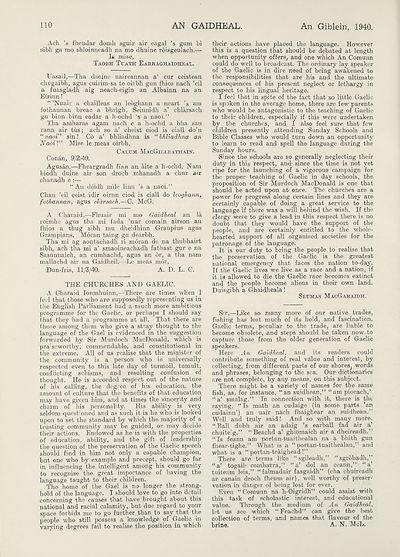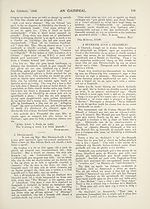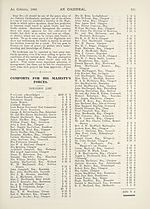An Comunn Gàidhealach Publications > Gaidheal > Volume 35, October 1939--September 1940
(118) Page 110
Download files
Complete book:
Individual page:
Thumbnail gallery: Grid view | List view

110
AN GAIDHEAL.
An Giblein, 1940.
Ach ’s fheudar domh sguir air eagal ’s gum bi
sibh ga mo shloinneadh na mo dhuine roisgeulach.—
Is mise,
Taobh Tuath Eahraghaidheal.
Uasail,—Tha daoine uaireannan a’ cur ceistean
chugaibh, agus cuirim-sa te oirbh gun fhios nach ’eil
a fuasgladh aig neach-eigin an Albainn na an
Efrinn!
“ ’Nuair a chailleas an leoghann a neart ’s am
fothannan breac a bhiigh, Seiunidh a’ chlarsach
gu binn binn eadar a h-ochd ’s a naoi.”
Tha amharas agam nach e a h-ochd a bha san
rann air tus; ach so a’ cheist ciod is ciall do’n
“naoi” sin? Co a’ bhliadhna is “bhliadhna an
Naoil” Mise le meas oirbh,
Caltjm MacGilleathain.
Conan, 9/2/40.
Agusan.—Fheargradh linn an aite a h-ochd. Nam
biodh duine air son droch mhanadh a chur air
chanadh e:—
“An deidh mile linn ’s a naoi.”
Chan ’eil ceist idir oimn ciod is ciall do leoghann,
fothannan, agus darsach.—C. McG.
A Charaid,—Fhuair mi mo Gaidheal an la
roimhe agus tha mi fada ’nur comain airson an
fhios a thug sibh mu dheidhinn Chaupius agus
Grampians. Moran taing gu dearbh.
Tha mi ag aontachadh ri moran de na thubhairt
sibh„ ach tha mi a’ smaoineachadh fathast gur e na
Sasunnaich, an cumhachd, agus an or, a tha nam
mallachd air na Gaidheil.—Le meas mor,
Dun-fris, 11/3/40. A. D. L. C.
THE CHURCHES AND GAELIC.
A Oharaid lonmhuinn,—There are times when I
feel that those who are supposedly representing us in
the English Parliament had a much more ambitious
programme for the Gaelic, or perhaps I should say
that they had a programme at all. That there are
those among them who give a stray thought to the
language of the Gael is evidenced in the suggestion
forwarded by Sir Murdoch MacDonald, which is
pra'seworthy, commendable, and constitutional in
the extreme. All of us realise that the minister of
the community is a person who isi universally
respected even to this late day of turmoil, tumult,
conflicting schisms, and resulting confusion of
thought. He is accorded respect out of the nature
of his calling, the degree of his education, the
amount of culture that the benefits of that education
may have given him, and at times the sincerity and
charm of his personality. His ability is very
seldom questioned and as such it is he who is looked
upon to set the standard by which the majority of a
trusting community may be guided, or may decide
their actions. Endowed as he is with the properties
of education, ability, and the gift of leadership
the question of the preservation of the Gaelic speech
should find in him not only a capable champion,
but one who by example and precept, should go far
in influencing the intelligent among his community
to recognise the great importance of having the
language taught to their children.
The home of the Gael is no longer the strong¬
hold of the language. I should love to go into detail
concerning the causes that have brought about this
national and racial calamity, but due regard to your
space forbids me to go further than to say that the
people \yho still possess a knowledge of Gaelic in
varying degrees fail to realise the position in which
their actions have placed the language. However
this is a question that should be debated at length
when opportunity offers, and one which An Comunn
could do well to broadcast. The ordinary lay speaker
of the Gaelic is in dire need of being awakened to
the responsibilities that are his and the ultimate
consequences of his present neglect or lethargy in
respect to his lingual heritage.
I feel that in spite of the fact that so little Gaelic
is spoken in the average home, there are few parents
who would be antagonistic to the teaching of Gaelic
to their children, especially if this were undertaken
by the churches, and I also feel sure that few
children presently attending Sunday Schools and
Bible Classes who would turn down an opportunity
to learn to read and spell the language during the
Sunday hours.
Since the schools are so generally neglecting their
duty in this respect, and since the time is not yet
ripe for the launching of a vigorous campaign for
the proper teaching of Gaelic in day schools, the
proposition of Sir Murdoch MacDonald is one that
should be acted upon at once. The churches are a
power for progress along certain lines and they are
certainly capable of doing a great service to the
language if there was a will behind the wish. If the
clergy were to give a lead in this respect there is no
doubt that they would have the support of the
people, and are certainly entitled to the whole¬
hearted support of all organised societies for the
patronage of the language.
It is our duty to bring the people to realise that
the preservation of the Gaelic is the greatest
national emergency that faces the nation to-day.
If the Gaelic lives we live as a race and a nation, if
it ia allowed to die the Gaelic race becomes extinct
and the people become aliens in their own land.
Duisgibh a Ghaidheala!
Setjmas MacGaeaidh.
Sir,—Like so many more of our native trades,
fishing has lost much of its hold, and fascination.
Gaelic terms, peculiar to the trade, are liable to
become obsolete, and steps should be taken now to
capture those from the older generation of Gaelic
speakers.
Here An Gaidheal, and its readers could
contribute something of real value and interest, by
collecting, from different parts of our shores^ words
and phrases, belonging to the sea. Our dictionaries
are not complete, by any means, on this subject.
There might be a variety of names for the same
fish, as, for instance, “an suidhean,” “am piocach,’
“ a’ smalag.” In connection with it, there is the
saying, “Is math an cudaige (in some parts ’an
cudainn’) an uair nach fhaighear an suidhean.”
Well and truly said! And so with many more.
“Ball dubh air an adaig ’s earball fad air a’
chuiteig.” “Reachd a’ ghiomaich air a dheireadh.”
“Is feann am portan-tuaithealan na a bhith gun
fhear-tighe.” What is a “portan-tuaithealan,” and
what is a “ portan-traighead ?”
There are terms like “sgileadh,” “ sgrobadh,”
“a’ togail comharra,” “a’ dol an ceann,” “a’
tuiteam leis,” “ falmadair fasgaidh” (cha chuireadh
ar canain droch fheum air), well worthy of preser¬
vation in danger of being lost for ever.
Even “ Comunn na h-Oigridh” could assist with
this task of scholastic interest, and educational
value. Through the medium of An Gaidheal,
let us see which “ Feachd” can give the best
collection of terms, and names that flavour of the
brine. A. N. McL.
AN GAIDHEAL.
An Giblein, 1940.
Ach ’s fheudar domh sguir air eagal ’s gum bi
sibh ga mo shloinneadh na mo dhuine roisgeulach.—
Is mise,
Taobh Tuath Eahraghaidheal.
Uasail,—Tha daoine uaireannan a’ cur ceistean
chugaibh, agus cuirim-sa te oirbh gun fhios nach ’eil
a fuasgladh aig neach-eigin an Albainn na an
Efrinn!
“ ’Nuair a chailleas an leoghann a neart ’s am
fothannan breac a bhiigh, Seiunidh a’ chlarsach
gu binn binn eadar a h-ochd ’s a naoi.”
Tha amharas agam nach e a h-ochd a bha san
rann air tus; ach so a’ cheist ciod is ciall do’n
“naoi” sin? Co a’ bhliadhna is “bhliadhna an
Naoil” Mise le meas oirbh,
Caltjm MacGilleathain.
Conan, 9/2/40.
Agusan.—Fheargradh linn an aite a h-ochd. Nam
biodh duine air son droch mhanadh a chur air
chanadh e:—
“An deidh mile linn ’s a naoi.”
Chan ’eil ceist idir oimn ciod is ciall do leoghann,
fothannan, agus darsach.—C. McG.
A Charaid,—Fhuair mi mo Gaidheal an la
roimhe agus tha mi fada ’nur comain airson an
fhios a thug sibh mu dheidhinn Chaupius agus
Grampians. Moran taing gu dearbh.
Tha mi ag aontachadh ri moran de na thubhairt
sibh„ ach tha mi a’ smaoineachadh fathast gur e na
Sasunnaich, an cumhachd, agus an or, a tha nam
mallachd air na Gaidheil.—Le meas mor,
Dun-fris, 11/3/40. A. D. L. C.
THE CHURCHES AND GAELIC.
A Oharaid lonmhuinn,—There are times when I
feel that those who are supposedly representing us in
the English Parliament had a much more ambitious
programme for the Gaelic, or perhaps I should say
that they had a programme at all. That there are
those among them who give a stray thought to the
language of the Gael is evidenced in the suggestion
forwarded by Sir Murdoch MacDonald, which is
pra'seworthy, commendable, and constitutional in
the extreme. All of us realise that the minister of
the community is a person who isi universally
respected even to this late day of turmoil, tumult,
conflicting schisms, and resulting confusion of
thought. He is accorded respect out of the nature
of his calling, the degree of his education, the
amount of culture that the benefits of that education
may have given him, and at times the sincerity and
charm of his personality. His ability is very
seldom questioned and as such it is he who is looked
upon to set the standard by which the majority of a
trusting community may be guided, or may decide
their actions. Endowed as he is with the properties
of education, ability, and the gift of leadership
the question of the preservation of the Gaelic speech
should find in him not only a capable champion,
but one who by example and precept, should go far
in influencing the intelligent among his community
to recognise the great importance of having the
language taught to their children.
The home of the Gael is no longer the strong¬
hold of the language. I should love to go into detail
concerning the causes that have brought about this
national and racial calamity, but due regard to your
space forbids me to go further than to say that the
people \yho still possess a knowledge of Gaelic in
varying degrees fail to realise the position in which
their actions have placed the language. However
this is a question that should be debated at length
when opportunity offers, and one which An Comunn
could do well to broadcast. The ordinary lay speaker
of the Gaelic is in dire need of being awakened to
the responsibilities that are his and the ultimate
consequences of his present neglect or lethargy in
respect to his lingual heritage.
I feel that in spite of the fact that so little Gaelic
is spoken in the average home, there are few parents
who would be antagonistic to the teaching of Gaelic
to their children, especially if this were undertaken
by the churches, and I also feel sure that few
children presently attending Sunday Schools and
Bible Classes who would turn down an opportunity
to learn to read and spell the language during the
Sunday hours.
Since the schools are so generally neglecting their
duty in this respect, and since the time is not yet
ripe for the launching of a vigorous campaign for
the proper teaching of Gaelic in day schools, the
proposition of Sir Murdoch MacDonald is one that
should be acted upon at once. The churches are a
power for progress along certain lines and they are
certainly capable of doing a great service to the
language if there was a will behind the wish. If the
clergy were to give a lead in this respect there is no
doubt that they would have the support of the
people, and are certainly entitled to the whole¬
hearted support of all organised societies for the
patronage of the language.
It is our duty to bring the people to realise that
the preservation of the Gaelic is the greatest
national emergency that faces the nation to-day.
If the Gaelic lives we live as a race and a nation, if
it ia allowed to die the Gaelic race becomes extinct
and the people become aliens in their own land.
Duisgibh a Ghaidheala!
Setjmas MacGaeaidh.
Sir,—Like so many more of our native trades,
fishing has lost much of its hold, and fascination.
Gaelic terms, peculiar to the trade, are liable to
become obsolete, and steps should be taken now to
capture those from the older generation of Gaelic
speakers.
Here An Gaidheal, and its readers could
contribute something of real value and interest, by
collecting, from different parts of our shores^ words
and phrases, belonging to the sea. Our dictionaries
are not complete, by any means, on this subject.
There might be a variety of names for the same
fish, as, for instance, “an suidhean,” “am piocach,’
“ a’ smalag.” In connection with it, there is the
saying, “Is math an cudaige (in some parts ’an
cudainn’) an uair nach fhaighear an suidhean.”
Well and truly said! And so with many more.
“Ball dubh air an adaig ’s earball fad air a’
chuiteig.” “Reachd a’ ghiomaich air a dheireadh.”
“Is feann am portan-tuaithealan na a bhith gun
fhear-tighe.” What is a “portan-tuaithealan,” and
what is a “ portan-traighead ?”
There are terms like “sgileadh,” “ sgrobadh,”
“a’ togail comharra,” “a’ dol an ceann,” “a’
tuiteam leis,” “ falmadair fasgaidh” (cha chuireadh
ar canain droch fheum air), well worthy of preser¬
vation in danger of being lost for ever.
Even “ Comunn na h-Oigridh” could assist with
this task of scholastic interest, and educational
value. Through the medium of An Gaidheal,
let us see which “ Feachd” can give the best
collection of terms, and names that flavour of the
brine. A. N. McL.
Set display mode to:
![]() Universal Viewer |
Universal Viewer | ![]() Mirador |
Large image | Transcription
Mirador |
Large image | Transcription
| An Comunn Gàidhealach > An Comunn Gàidhealach Publications > Gaidheal > Volume 35, October 1939--September 1940 > (118) Page 110 |
|---|
| Permanent URL | https://digital.nls.uk/125144600 |
|---|
| Description | This contains items published by An Comunn, which are not specifically Mòd-related. It includes journals, annual reports and corporate documents, policy statements, educational resources and published plays and literature. It is arranged alphabetically by title. |
|---|
| Description | A collection of over 400 items published by An Comunn Gàidhealach, the organisation which promotes Gaelic language and culture and organises the Royal National Mòd. Dating from 1891 up to the present day, the collection includes journals and newspapers, annual reports, educational materials, national Mòd programmes, published Mòd literature and music. |
|---|---|
| Additional NLS resources: |
|

